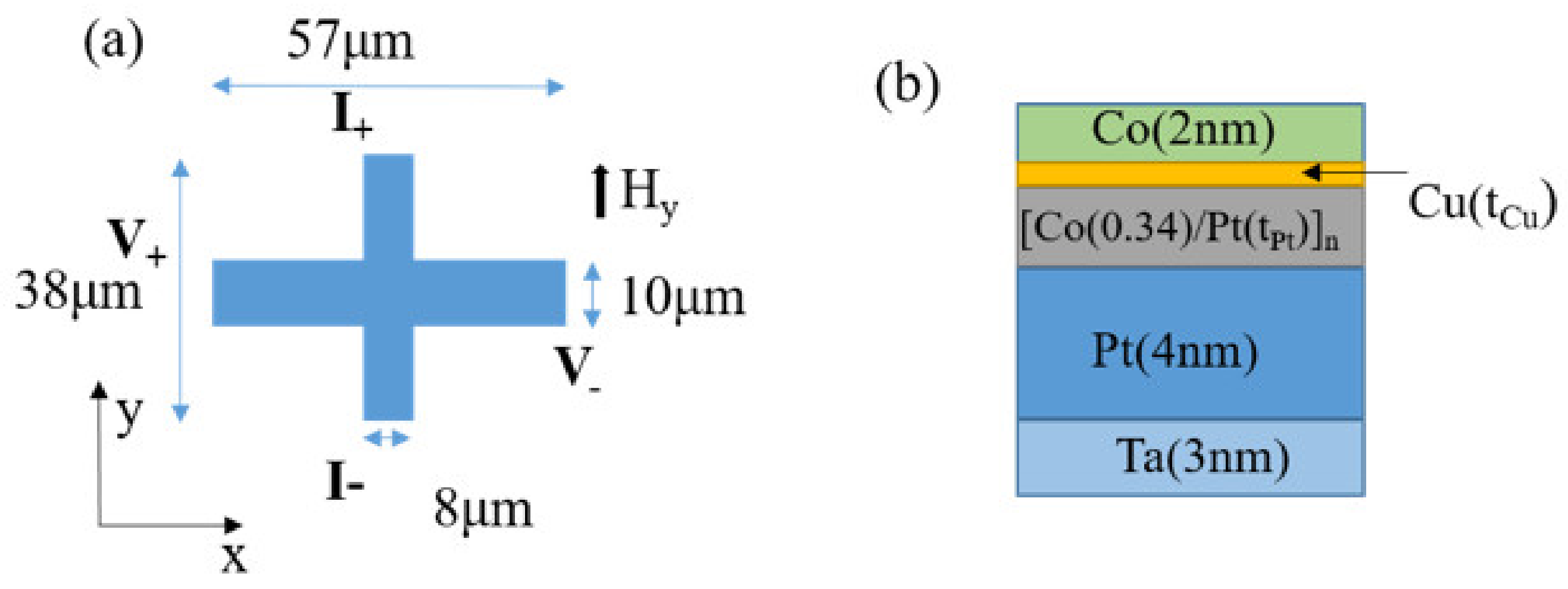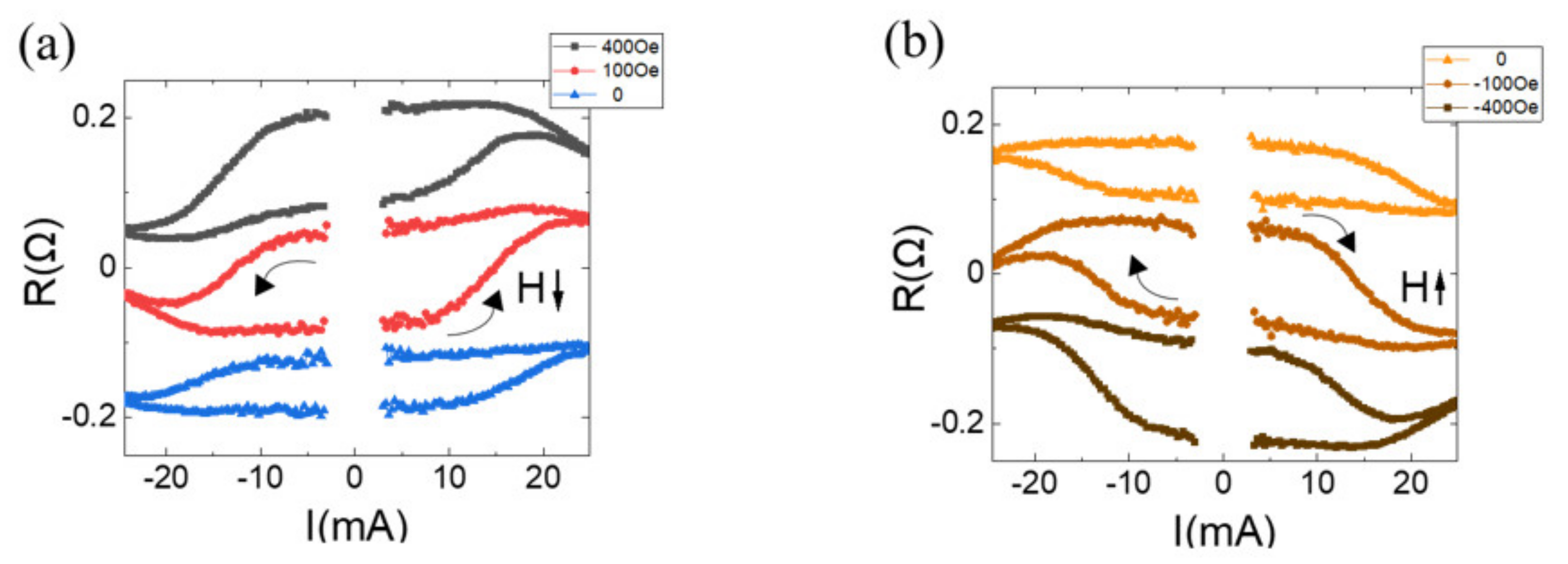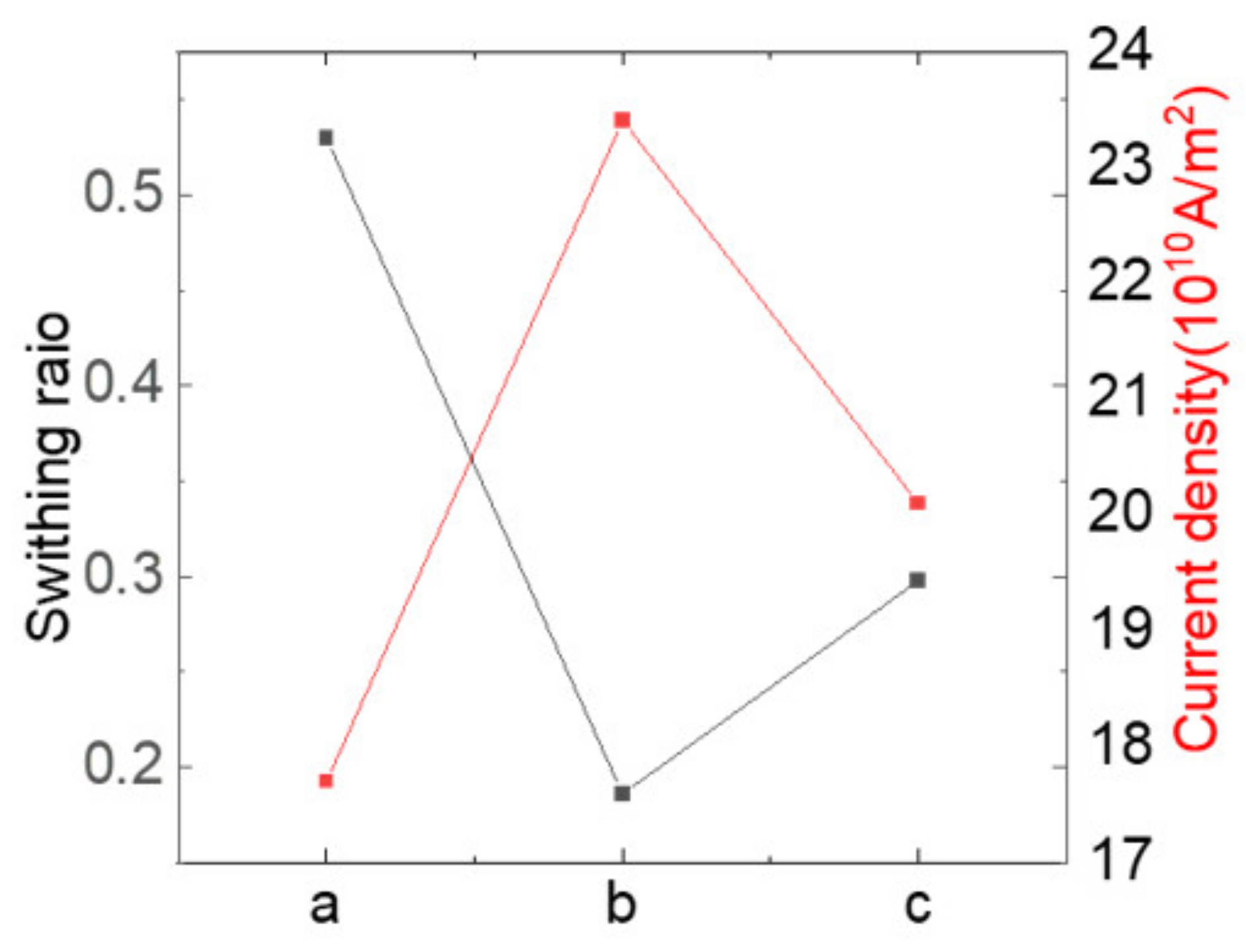1. Introduction
Field-free magnetic switching, using spin-orbit torque (SOT), has emerged as a promising technique in spintronics, particularly for applications in magnetic random-access memory (MRAM) [
1,
2,
3], spin logic devices [
4,
5], and spin oscillators [
6,
7]. The concept of SOT involves the use of spin currents generated by the spin Hall effect or Rashba-Edelstein effect to manipulate the magnetization of a ferromagnetic layer. This method offers significant advantages over traditional spin-valve type MRAMs, which typically require an external magnetic field for deterministic switching, and over spin-transfer torque (STT) mechanisms [
8].
The exploration of SOT began in the early 2000s, with initial studies focusing on heavy metals like platinum (Pt) and tantalum (Ta) due to their strong spin-orbit coupling [
9,
10,
11]. Over the years, researchers have demonstrated the potential of SOT in achieving efficient magnetization switching. A significant milestone was the realization of field-free switching by engineering the symmetry of the magnetic heterostructures, such as using canted deposition of materials like molybdenum (Mo) and tungsten (W) [
12,
13,
14].
One of the primary advantages of SOT-based switching is the elimination of the need for an external magnetic field, which simplifies device architecture and reduces power consumption [
15,
16,
17]. Additionally, SOT offers faster switching speeds and higher endurance compared to STT, making it suitable for high-performance memory applications [
8]. The ability to achieve deterministic switching through structural engineering, rather than relying solely on material properties, opens new avenues for device optimization.
Despite its advantages, SOT-based switching faces several challenges. The efficiency of spin current generation and transfer is highly dependent on the materials and their interfaces, which can complicate the fabrication process. Moreover, symmetry breaking is necessary to achieve uniform and reliable switching across magnetic layer with perpendicular magnetic anisotropy. Researchers have explored the diverse approaches, such as synthetic antiferromagnetic systems [
18], magnetic runnel junction with 2D materials [
19], in-plane exchange bias [
20], and compositional variations in magnetic layer [
21], etc. The need for precise control over the growth and deposition of materials adds the complexity and cost to manufacturing SOT-electronic devices .
The Co/Pt multilayer system exhibits several interesting magnetic properties, making it a subject of extensive research in the field of spintronics and magnetic storage technologies. Co/Pt multilayers are known for their strong perpendicular magnetic anisotropy, which means the magnetic moments prefer to align perpendicular to the plane of the layers. [
27] This property is crucial for high-density magnetic storage applications. The magnetization and coercivity of Co/Pt multilayers can be tuned by varying the thickness of the Co and Pt layers. Thicker Co layers tend to increase the in-plane magnetic anisotropy, while thinner layers enhance the perpendicular anisotropy. The coercivity, which is the resistance to demagnetization, can also be significantly high, especially when the layers are grown at elevated temperatures. [
28] The coupling between Co and Pt layers can lead to complex magnetic behaviors. For instance, the presence of Pt can mediate ferromagnetic coupling between Co layers and its coupling strength and direction of spin alignment shows oscillatory change, depending on nonmagnetic spacer thickness. It is described by the Ruderman-Kittel-Kasuya-Yosida (RKKY) theory [
29,
30,
31,
32]. These properties make Co/Pt multilayers a versatile and valuable system for both fundamental research and practical applications in magnetic storage and spintronic devices. In this work, we demonstrate field-free SOT magnetic switching in a [Co/Pt]/Cu/Co system. By optimizing the thicknesses of the Cu and Pt layers to adjust the interlayer exchange coupling and magnetic anisotropy strength, respectively, we achieved the optimal conditions for reliable switching.
3. Results And Discussion
Figure 2 shows the magnetic hysteresis loops of magnetic stacks with
,
and
, 3, and 4. The multilayers with
and 4 exhibit only in-plane magnetic anisotropy (IMA) (
Figure 2(a)), and out-of-plane magnetic anisotropy (OMA) (
Figure 2(c)), respectively. In contrast, the multilayer with
displays both IMA and OMA (
Figure 2(b)). Since the
multilayer and the Co layer inherently possess OMA and IMA, respectively, the data in
Figure 2 suggests strong interlayer coupling between them, specifically through exchange interaction via the Cu space layer. For
, this interlayer coupling causes the perpendicular magnetic moments to rotate in-plane. Conversely, for
, the coupling induces the in-plane magnetic moments of the Co layer to rotate perpendicular to the plane. For
, the IMA in the Co layer and the OMA in the Co/Pt layer compete to maintain their respective magnetic anisotropies. Given the strong interlayer coupling, it is inferred that the magnetic anisotropy strength on both sides is significantly reduced. The coercive field for IMA in
Figure 2(b)
is smaller than that in
Figure 2(a)
, and the coercive field for OMA in
Figure 2(b)
is smaller than that in
Figure 2(c)
. The variations in the coercive field are consistent with the scenario of reduced magnetic anisotropy strength.
Figure 3(a) shows the Hall resistance
as a function of current for the sample with
,
and
under various fields of 0, 100, and 400 Oe. The current pulse with a duration of 1 ms is applied along the +
y-axis to the Hall bar structure depicted in
Figure 1(a). The Hall resistance difference is defined as
, where
and
are the resistances when current flows along the positive and negative
y-axis, respectively. Because the Hall resistance is due to the anomalous Hall effect induced by the magnetization in the Co/Pt multilayer, the difference indicates magnetic moment polarity switching induced by the combination of applied current and field. For
,
is observed to be
, indicating that the magnetic polarity of the Co/Ft multilayer is deterministically switched solely by the applied current. When
,
increases to
, suggesting that the field enhances the magnetic switching. No further enhancement was observed with an increase in the applied field, i.e.,
. The switching ratio is defined as
to be
.
The same measurements were performed for the samples with , and and 4. For , no magnetic polarity change was observed. For , magnetic polarity change was observed only when a magnetic field was applied, indicating no zero field switching. In this case, the externally applied field acts as a symmetry breaker for current-induced magnetic switching. Therefore, the magnetic structure with , and has appropriate interlayer coupling between the Co/Pt multilayer and the Co layer, providing an effective internal field as a symmetry breaker, making current- induced magnetic switching possible.
Figure 3(b) shows the Hall resistance with the filed along the –
y-axis. Compared to the
data in
Figure 3(a), there is almost no change in
behaviors with the fields of 0, –100, and – 400 Oe. This indicates that the sample in this study is free from field-dependent directional symmetries, such as geometrical gradient, compositional inhomogeneity and interface DMI effect, for current-induced magnetic switching, other than the internal field due to interlayer coupling. The internal field is found to be biaxial along the
y-axis.
To investigate the effects of Cu space layer thickness on magnetic polarity, samples with
,
, and
and 0.9 were fabricated. Their magnetizations were plotted as a function of the field in
Figure 4(a) and
Figure 4(b), respectively. For
, the sample loses its OMA characteristics in the Co/Pt multilayer, and no magnetic polarity switching was observed, as expected. For
, both IMA in the Co layer and OMA in the Co/Pt multilayer are maintained. Hall bar measurement was performed and plotted in
Figure 4(c). Field-free switching was observed with a value of
, which is much smaller than that in
Figure 3. The
values reach to their maximum at
and
Oe. The switching ratio is
. It can be noted that a decrease in Cu layer thickness enhances interlayer coupling, destroying OMA in the Co/Pt multilayer, and that an increase weakens interlayer coupling, reducing the internal field for current-induced switching, and maintaining the coercive field almost unchanged.
Given the significant dependence of OMA characteristics on Pt thickness in Co/Pt multilayers, samples with
,
, and
and 1.0 were fabricated. Their magnetization was plotted as a function of the field in
Figure 5(a) and
Figure 5(b), respectively. For
, the sample loses its OMA characteristics in the Co/Pt multilayer. Assuming that interlayer coupling through the Cu space layer (
) is the same as in
Figure 2, the loss of OMA is likely due to the reduction of OMA strength with a smaller Pt layer thickness. The reduction is consistent with the results in reference [
31]. For
, both IMA in the Co layer and OMA in the Co/Pt multilayer are maintained. The coercive field in OMA magnetization significantly increases compared to that in
Figure 2(b), indicating enhanced magnetic anisotropy strength. Hall bar measurements were performed and plotted in
Figure 5(c). Field-free switching is observed with a value of
, which is much smaller than that in
Figure 3 and comparable to that in
Figure 4.
values reach to their maximum at
and
Oe. The switching ration is found to be
. The condition of the internal field from
and OMA strength from
is not optimal for yielding magnetic switching as effectively as in
Figure 3(b).
The zero-field switching ratios in
Figure 3,
Figure 4, and
Figure 5, along with the critical current density for switching, are summarized in
Figure 6 for comparison.
The sample with , and shows the highest switching ratio () and the lowest critical current density (). In contrast, the sample with , and exhibits the lowest switching ratio () and the highest critical current density (). The sample with , and has a switching ratio of and a critical current density of . Additionally, deviating from the optimal values for both anisotropy and interlayer coupling reduces the effectiveness of magnetic switching, with magnetic anisotropy having a more detrimental effect than interlayer coupling.
Figure 1.
Schematic sample layout of (a) top-view of the Hall bar and (b) layer sequence in the cross section of the Hall bar.
Figure 1.
Schematic sample layout of (a) top-view of the Hall bar and (b) layer sequence in the cross section of the Hall bar.
Figure 2.
Magnetization as a function of the applied field for a magnetic system of : (a) , , and , (b), , and , and (c) , , and . Inset shows probable schematic magnetic configuration in each condition.
Figure 2.
Magnetization as a function of the applied field for a magnetic system of : (a) , , and , (b), , and , and (c) , , and . Inset shows probable schematic magnetic configuration in each condition.
Figure 3.
Anomalous Hall resistance as a function of the applied current for a magnetic system of with , , and , under the specified external fields: (a) field along + y-axis and (b) field along – y-axis. The data is shifted off for comparison.
Figure 3.
Anomalous Hall resistance as a function of the applied current for a magnetic system of with , , and , under the specified external fields: (a) field along + y-axis and (b) field along – y-axis. The data is shifted off for comparison.
Figure 4.
Magnetization as a function of the applied field for a magnetic system of : (a) , and and (b) , and . (c) Anomalous Hall resistance as a function of the applied current with specified external fields parallel to the current direction (the y-axis) for the sample of (b). The data are shifted off for comparison.
Figure 4.
Magnetization as a function of the applied field for a magnetic system of : (a) , and and (b) , and . (c) Anomalous Hall resistance as a function of the applied current with specified external fields parallel to the current direction (the y-axis) for the sample of (b). The data are shifted off for comparison.
Figure 5.
Magnetization as a function of the applied field for a magnetic system of : (a) , and , and (b) , and . (c) Anomalous Hall resistance as a function of the applied current with specified external fields parallel to current direction (the y-axis) for the sample of (b). The data are shifted off for comparison.
Figure 5.
Magnetization as a function of the applied field for a magnetic system of : (a) , and , and (b) , and . (c) Anomalous Hall resistance as a function of the applied current with specified external fields parallel to current direction (the y-axis) for the sample of (b). The data are shifted off for comparison.
Figure 6.
Magnetic switching ratio of zero-field switching (black symbols, left vertical axis) to the magnetic full switching under a field of 400 O and critical current density (red symbols, right vertical axis) for the samples: (a) , , and , (b) , , and and (c) , , and .
Figure 6.
Magnetic switching ratio of zero-field switching (black symbols, left vertical axis) to the magnetic full switching under a field of 400 O and critical current density (red symbols, right vertical axis) for the samples: (a) , , and , (b) , , and and (c) , , and .










